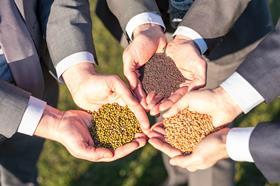
The world’s first ‘activated air’ seed sterilisation system, Aurora Z10, has been created by Loughborough University start-up Zayndu as a dry alternative to chemical treatment or washing.
The system, launched at the Agri-TechE event on 19 January, will allow certain high-value seeds to be sterilised for the very first time. It is well suited to high-value seeds such as tomato or fast-growing seeds like rocket.
Trials in wheat produced a fourfold increase in early germinationwhen compared with untreated seed.
Seed cleaning reduces the pathogen load on the seed and protects the soil from contamination with seedborne fungal infection. However, many of the chemicals widely used for disinfection are being withdrawn from use so alternatives are urgently needed.
Ralph Weir, CEO of Zayndu, explained that the system gets its name from the aurora borealis (or northern lights), a naturally-occurring plasma created when an electric current moves through air.
“The Aurora Z10 is the first in a series of products and is aimed at high value seeds for which there is no treatment at present,” he said.
“The seeds are contained in a sealed rotating drum and we introduce a current, which splits oxygen and nitrogen molecules into individual atoms creating a plasma. This 'activated air', technically a blend of RONS (Reactive Oxygen and Nitrogen Species), is a powerful disinfectant.
“The RONS are desperate for something to latch on to and tear apart bacteria, fungi or viruses present in the chamber. The seeds are not affected as they are protected by their thick walls, so coming out of the drum are just cleaned seeds and fresh air.”
Weir explained that the technique overcomes a number of problems faced by seed suppliers.
“The gold standard fungicide seed treatment is Thiram, which prevents damping-off diseases in seedlings. This has recently been withdrawn, so the pathogen load on seeds is increasing, leading to the waste of seed or risk of contaminating the soil.
“We have done trials of our technology with many crop varieties and it both destroys the pathogens and typically boosts germination.”
Zayndu’s first product has a capacity of 1kg of seed per batch so the company is concentrating on high value seed such as flowers, fruit and vegetables. Tomato seeds can be worth €5 a seed.
Further products are in production with a larger system, the Z100, due for commercial availability in the summer, with ever-larger systems thereafter.
Weir is realistic: “The Z10 is great for high-value seeds processed in small batches, of grams to kilograms – but carrots are processed in tonnes per day throughput. We’re working towards those systems now.
“Some seeds are untreatable at present, for example fast-growing salads where the time to harvest is too short to allow the chemicals to dissipate or where the seeds, like basil and other herbs are mucilaginous and germinate on contact with water.
“This is problematic as existing decontamination involves chemicals dissolved in water or a hot dip at 500°C.Our treatment is completely dry, enabling disinfection of herbs, salads or staple crops such as wheat.”



